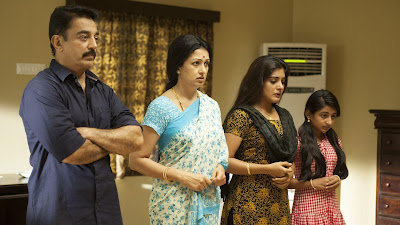Papanasam ***
Dir: Jeethu Joseph.
With: Kamal Hassan, Gautami, Niveda Thomas, Esther. 181 mins. Cert: 12A
In last week’s Sardarji review, I mentioned how Indian
directors and stars frequently move between the country’s regional industries.
The new release Papanasam arrives as
a fine demonstration of how ideas can
likewise cross those same borders. Jeethu Joseph’s thriller Drishyam was one of Malayalam cinema’s
biggest hits in 2013; Joseph has now remade it in Tamil, porting over a
compelling (and very contemporary) idea about images, and what we do with them.
Perhaps it’s the proximity of these cinemas, but little appears to have been
lost in transit: the central conceit travels more comfortably than those
sustaining many recent remakes.
Its protagonist
Suyambu (Kamal Hassan) has a very specific task. As local head of a national
cable TV company, he’s obliged to spend the better part of each day watching
the feed coming into the eponymous village, in order to ensure the provision of
continuous and unscrambled service. Classic movies, new quiz formats, current
affairs: old square-eyes surveys them all, conferring upon himself the status
of walking Wikipedia. At lunch, he offers legal briefs to those pestered by
corrupt cops; by night, he replays love scenes with his adoring wife Rani
(Gautami). He may be the cinema’s foremost mansplainer. Funny thing: we like
him.
Hassan, an amiably
schlubby Tamil megastar, plays Suyambu like a sponge, soaking up cathode rays
as a booster for his minimal formal education; at home, he’s realised he’s
outnumbered – by wife and two daughters – and long made peace with that.
(Joseph gives him some nicely observed dad business: fussing over light
switches, insisting that everyone sit on the furniture properly.) This
evocation of harmonious domesticity is sweet rather than cloying, and such that
we don’t see disruption looming. But here it is, all the same: a police
inspector’s ne’er-do-well son, brandishing footage of the eldest girl changing,
and threatening to disseminate it.
At which point –
marked by a suitably melodramatic downpour – Papanasam turns into a very different film, switching from The Simpsons to Shallow Grave as Rani and daughters take extreme measures to
neutralise the threat, leaving Suyambu to test his CSI knowledge. This development could break a less robustly
constructed film; Joseph’s trick is to make such a good case for the integrity
of this family unit over the first hour that you want to know whether it can
survive intact – and, indeed, whether received wisdom, in the form of regular
basic-cable programming, can help anybody dodge a murder charge.
As the film resolves
itself into a battle between two clans – one wielding a truncheon, the other
the remote – Joseph’s screenplay keeps raising interesting, shaded questions.
Could zapping from Love Island to Law & Order one night provide you
with a legitimate defence at some future moment of crisis? Would knowing the
good cop/bad cop dynamic make us less likely to fold when under interrogation –
or is there some next-level questioning technique that hasn’t yet made it onto
our screens? In short: rather than rotting our minds – as our elders always
warned – has TV made us smart enough to beat the system?
At three hours, it’s
far from punchy: while you’d keep the verdant scenery – a sign of a filmmaker
who knows when to look beyond the box – some of its later narrative mechanics
could do with a degree of tightening. Nevertheless, that length gives Papanasam the air of a slowburn modern
morality play, winding its way through to a slyly concealed final twist. A
Hindi remake, with Ajay Devgn in the Hassan role, is already in the works; it
wouldn’t surprise me if an adventurous Western producer snaffled the rights for
an eventual English-language translation. This idea may travel further still.
Papanasam is now playing in selected cinemas.

No comments:
Post a Comment